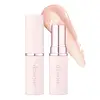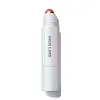What's inside
What's inside
 Key Ingredients
Key Ingredients

 Benefits
Benefits

 Concerns
Concerns

 Ingredients Side-by-side
Ingredients Side-by-side

Diisostearyl Malate
EmollientOctyldodecanol
EmollientPolybutene
Polyethylene
AbrasiveVp/Eicosene Copolymer
Mica
Cosmetic ColorantCI 77891
Cosmetic ColorantMicrocrystalline Wax
Emulsion StabilisingHydrogenated Microcrystalline Wax
Emulsion StabilisingSynthetic Wax
AbrasivePolyglyceryl-6 Polyricinoleate
Emulsifying1,2-Hexanediol
Skin ConditioningPentaerythrityl Tetra-Di-T-Butyl Hydroxyhydrocinnamate
AntioxidantTin Oxide
AbrasiveCI 75470
Cosmetic ColorantCI 77510
Cosmetic ColorantDicalcium Phosphate
AbrasiveBHT
AntioxidantDiisostearyl Malate, Octyldodecanol, Polybutene, Polyethylene, Vp/Eicosene Copolymer, Mica, CI 77891, Microcrystalline Wax, Hydrogenated Microcrystalline Wax, Synthetic Wax, Polyglyceryl-6 Polyricinoleate, 1,2-Hexanediol, Pentaerythrityl Tetra-Di-T-Butyl Hydroxyhydrocinnamate, Tin Oxide, CI 75470, CI 77510, Dicalcium Phosphate, BHT
Pentaerythrityl Tetraisostearate
EmollientOctyldodecanol
EmollientPolybutene
Diisostearyl Malate
EmollientSynthetic Wax
AbrasiveSynthetic Fluorphlogopite
Bis-Diglyceryl Polyacyladipate-2
EmollientVp/Hexadecene Copolymer
Arnica Montana Flower Extract
MaskingUndaria Pinnatifida Extract
Skin ConditioningCrithmum Maritimum Extract
Skin ConditioningSodium Hyaluronate
HumectantSqualane
EmollientPrunus Armeniaca Kernel Oil
MaskingPseudozyma Epicola/Camellia Sinensis Seed Oil Ferment Extract Filtrate
HumectantPseudozyma Epicola/Apricot Kernel Oil/Olive Fruit Oil/Sunflower Seed Oil/Sweet Almond Oil/(Angelica Gigas/Lithospermum Erythrorhizon) Root Extract Ferment Extract Filtrate
Pseudozyma Epicola/Sunflower Seed Oil Ferment Extract Filtrate
Emulsion StabilisingCaprylic/Capric Triglyceride
MaskingRicinus Communis Seed Oil
MaskingPentaerythrityl Tetra-Di-T-Butyl Hydroxyhydrocinnamate
AntioxidantHydrogenated Castor Oil
EmollientTin Oxide
AbrasiveCI 77491
Cosmetic ColorantCI 77891
Cosmetic ColorantPentaerythrityl Tetraisostearate, Octyldodecanol, Polybutene, Diisostearyl Malate, Synthetic Wax, Synthetic Fluorphlogopite, Bis-Diglyceryl Polyacyladipate-2, Vp/Hexadecene Copolymer, Arnica Montana Flower Extract, Undaria Pinnatifida Extract, Crithmum Maritimum Extract, Sodium Hyaluronate, Squalane, Prunus Armeniaca Kernel Oil, Pseudozyma Epicola/Camellia Sinensis Seed Oil Ferment Extract Filtrate, Pseudozyma Epicola/Apricot Kernel Oil/Olive Fruit Oil/Sunflower Seed Oil/Sweet Almond Oil/(Angelica Gigas/Lithospermum Erythrorhizon) Root Extract Ferment Extract Filtrate, Pseudozyma Epicola/Sunflower Seed Oil Ferment Extract Filtrate, Caprylic/Capric Triglyceride, Ricinus Communis Seed Oil, Pentaerythrityl Tetra-Di-T-Butyl Hydroxyhydrocinnamate, Hydrogenated Castor Oil, Tin Oxide, CI 77491, CI 77891
Ingredients Explained
These ingredients are found in both products.
Ingredients higher up in an ingredient list are typically present in a larger amount.
Ci 77891 is a white pigment from Titanium dioxide. It is naturally found in minerals such as rutile and ilmenite.
It's main function is to add a white color to cosmetics. It can also be mixed with other colors to create different shades.
Ci 77891 is commonly found in sunscreens due to its ability to block UV rays.
Learn more about CI 77891Diisostearyl Malate is an emollient and most often used in lip products. It comes from isostearyl alcohol, a fatty acid, and malic acid, an AHA.
As an emollient, Diisostearyl Malate helps create a thin film on your skin to trap moisture in. This helps keep your skin soft and smooth.
Octyldodecanol is a fatty alcohol. It is primarily used to enhance the texture of products.
As an emulsifier, Octyldodecanol helps prevent the oils and waters from separating. It also prevents ingredients from creating foam when shaken.
Octyldodecanol is created by reducing fatty acid to an alcohol.
Due to its high molecular weight, it does not get absorbed into the skin.
Learn more about OctyldodecanolPentaerythrityl Tetra-Di-T-Butyl Hydroxyhydrocinnamate (long name, huh?) is a synthetic antioxidant.
It is used to help stabilize other antioxidants or prevent the color from changing in a product.
As an antioxidant, it helps fight free-radical molecules. Free-radical molecules are capable of damaging our cells and other genetic material. Thus, antioxidants may reduce the signs of aging.
This ingredient is oil-soluble.
Learn more about Pentaerythrityl Tetra-Di-T-Butyl HydroxyhydrocinnamatePolybutene is used to help control the viscosity of a product. This just means it helps adjusts the texture.
It is a polymer and does not get absorbed into the skin due to its large size.
Studies found this ingredient did not irritate skin in concentrations below 15%.
Learn more about PolybuteneSynthetic Wax is created from fossil fuels such as natural gas. It is used to enhance texture, adjust pH, and as an occlusive.
It may also be used as an abrasive ingredient to exfoliate the skin.
Synthetic Wax may not be fungal acne safe.
Learn more about Synthetic WaxTin Oxide is an inorganic oxide used to add opacity and volume to a product. In nature, it is already found in mineral form. The main ore of tin is an opaque and shiny mineral called casseterite.
Tin Oxide helps remove translucency in a product, or make it more opaque. Besides adding opacity, tin oxide is used for bulking to add volume.